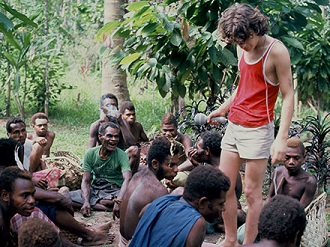
Life is a Very Strange Thing 2018
Distributed by Documentary Educational Resources, 108 Water Street, 5A, Watertown, MA 02472; 617-926-0491
Produced by Annie Stiven and Les McLaren
Directed by Annie Stiven and Les McLaren
Streaming, 78 mins
General Adult
Ethnographic Film
Date Entered: 12/03/2021
Reviewed by Angela Walker, Reference & Instruction Librarian, Eastern Connecticut State UniversityThe Australian filmmakers Annie Stiven and Les McLaren have created a film that is neither on a specific topic, nor a biography about a well-known person. They record the daily life of Frédéric Duvelle, following him around with the camera in contemporary Paris as he meets friends and family members, goes about his routines, and comments on the course of this “strange” life that was handed to him.
The filmmakers have met their subject more than 30 years ago in the 1970s in Papua New Guinea where Frédéric spent his young adult years to create an archive of traditional music. His grandfather was a governor in colonial Indochina, his father was a composer who grew up in Cambodia and became the pioneering recorder of traditional music in Africa. He handed this project over to his 17-year-old son, a troublemaker who spent the next few years of his life immersed in a culture so very different from his former life that it forever changed his perspectives. Through Frédéric’s own account, as well as archival footings and family stories the film forms a mosaic about his unusual life and delivers a family chronicle that spans four generations.
The scenery is interesting, especially for Francophiles looking for a Paris that is usually not accessible to tourists. Following the camera, they now find themselves in private quarters, listening in on family conversations, observing friends get together to discuss politics and current events, and other chance encounters in the streets. When recounting the past, we hear snippets of indigenous music, when in Paris and Bordeaux, we get to be observers of life in France today. There are many discoveries to be made in this film that attempts to simply meet the ‘other.’ It is about daily life in a close-knit urban culture, but also about the effects that politics, history, and terrorist attacks have on it. “The most difficult thing to do in life is to be happy unless you don’t watch TV, don’t talk to anyone” is one of Frederic’s pieces of wisdom.
While this is an interesting form of cinematic storytelling and it successfully creates some sort of portrait of a country and a cultural setting, it is a difficult film to apply for educational purposes. It is not clear what audience it is for or what should be learned from it. Nothing goes into depth. Since this recounted path of life came about mostly based on the decisions of others, it does not serve as a coming-of-age story that might be exemplary or inspiring. For the audience, the observation of the unknown stays on the surface. Best to be enjoyed individually rather than in the classroom.
Published and licensed under the Creative Commons Attribution 4.0 license. Anyone can use these reviews, so long as they comply with the terms of the license.